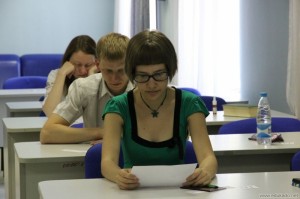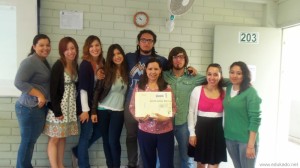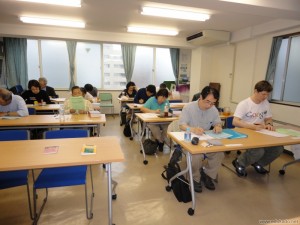World Esperanto Exam Day: June 8 Posted by Chuck Smith on May 9, 2013 in Uncategorized
Did you know that you can take an Esperanto exam to prove that you can read and write at a certain level? On June 8, people will be taking Esperanto exams around the world, which are legally recognized by the Hungarian state. Hungary makes sense, because 5,000 people receive diplomas there every year to prove their Esperanto abilities.
There are times when it is useful to be able to prove your skills, such as when applying for an international project or an Esperanto-speaking job. Fortunately, the exams have been painstakingly created under the same conditions and standards used by other great language institutions such as Goethe and Alliance Française.
Previously, there were many different language level systems between countries, which made it difficult to compare language test results internationally. Then, in 1991, a conference on “Transparency and Coherence in Language Learning in Europe: Objectives, Evaluation, Certification” was held in Switzerland to discuss this and similar issues. There the Common European Framework of Reference for Languages was founded, establishing six standard language levels now accepted worldwide:
- A Basic User
- A1 Breakthrough or beginner
- A2 Waystage or elementary
- B Independent User
- B1 Threshold or intermediate
- B2 Vantage or upper intermediate
- C Proficient User
- C1 Effective Operational Proficiency or advanced
- C2 Mastery or Proficiency
Esperanto exams can be taken in the following levels: B1, B2 and C1. Once you decide on your language level to be tested, you need to find a testing location. You can find the complete list of testing locations online, which will hopefully have a location near you. Such exams could also potentially be useful if you want to create an independent study for Esperanto at your university and need to prove your proficiency at the end of your studies. If you pass the exam, you’ll receive a diploma certifying your achievement written in Esperanto, English, French and German.
If there is no testing location near you and you would like to organize the exam, act quickly, since there is now less than a month left until the exam day. To run an exam, you will need an organizer and an assistant (preferably non-Esperanto-speaking) who can help with local preparations. It is highly recommended that the organizer does not participate in the exam themselves to ensure the integrity of the exam session. Also, there needs to be at least five people ready to take the exam in your city, so the exam can take place. If you would like more details about organizing a session, you can find out more on edukado.net (free edukado account needed).
In any case, it is critical for Esperanto speakers to take these exams to show that there is a demand for them, so they will continue to be offered in the future. If you are serious about Esperanto, this diploma can prove that this is more than just your hobby, so you can be sure to be taken seriously, such as when you represent Esperanto at international organizations or projects. Even if you personally don’t need the diploma, these exams have also helped others hear about Esperanto, thus resulting in interviews on Russia and Serbia television.
Whether you can participate or not, I think we all can agree that these official exams are good to help Esperanto be treated like other foreign languages. Having this opportunity can only encourage Esperanto’s use in academia and commerce. If you are taking the exam, then I wish you the best of luck, and if in Berlin, we can pass it together there.
If you haven’t yet registered and would like to join us, please fill out the form for your city on the KER-exam registration page!

Build vocabulary, practice pronunciation, and more with Transparent Language Online. Available anytime, anywhere, on any device.
About the Author: Chuck Smith
I was born in the US, but Esperanto has led me all over the world. I started teaching myself Esperanto on a whim in 2001, not knowing how it would change my life. The timing couldn’t have been better; around that same time I discovered Wikipedia in it’s very early stages and launched the Esperanto version. When I decided to backpack through Europe, I found Esperanto speakers to host me. These connections led me to the Esperanto Youth Organization in Rotterdam, where I worked for a year, using Esperanto as my primary language. Though in recent years I’ve moved on to other endeavors like iOS development, I remain deeply engrained in the Esperanto community, and love keeping you informed of the latest news. The best thing that came from learning Esperanto has been the opportunity to connect with fellow speakers around the globe, so feel free to join in the conversation with a comment! I am now the founder and CTO of the social app Amikumu.






